Dangerous Corner was the first play by the English writer J. B. Priestley. It was premiered in May 1932 by Tyrone Guthrie at the Lyric Theatre, London, and filmed in 1934 by Phil Rosen.

Transgression is a 1931 Pre-Code American drama film directed by Herbert Brenon, using a screenplay written by Elizabeth Meehan, adapted from Kate Jordan's 1921 novel, The Next Corner. The film stars Kay Francis, Paul Cavanagh, and Ricardo Cortez, and deals with the romantic entanglements of a wealthy English businessman, his wife and a Spanish nobleman.

Beyond Victory is a 1931 American pre-Code war film starring Bill Boyd, James Gleason, Lew Cody, and ZaSu Pitts. While John Robertson received directing credit, Edward H. Griffith supposedly took extensive re-takes after production ended and the film was deemed not audience ready. Two actresses with major roles in the original version were completely cut from the final release, Helen Twelvetrees and June Collyer. The original screenplay was written by Horace Jackson and James Gleason. While the film might not have made a profit at the box office, it was well received by critics.
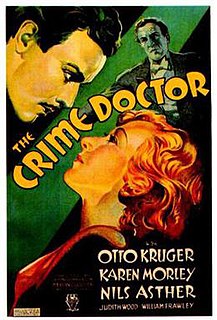
The Crime Doctor is a 1934 American crime drama directed by John Robertson from a screenplay by Jane Murfin, adapted from the novel The Big Bow Mystery by Israel Zangwill. The film stars Otto Kruger, Karen Morley, and Nils Asther. RKO Radio Pictures produced and distributed the film which was released on April 27, 1934.

Cockeyed Cavaliers is a 1934 American pre-Code comedy film starring the comedy duo of Wheeler & Woolsey. Directed by Mark Sandrich from a screenplay by Edward Kaufman, Grant Garrett, Ralph Spence and Ben Holmes. Also featured in the cast were Dorothy Lee and Thelma Todd.

By Your Leave is a 1934 American domestic comedy film directed by Lloyd Corrigan from a script by Allan Scott, Lewis Foster, and Sam Mintz. The screenplay was based on a play of the same name by Gladys Hurlbut and Emma B. C. Wells, which had a short run early in the year at the Morosco Theatre. The film was produced by Pandro S. Berman, and starred Frank Morgan and Genevieve Tobin, although several other actresses were initially scheduled to appear in the film, including Mary Astor and Ann Harding. Both stars were on loan to RKO from other studios. It marked the film debuts of two notable Broadway actors, Glenn Anders and Gene Lockhart, the latter of which had a lengthy Hollywood career. By Your Leave opened on November 9, 1934, and received mostly positive reviews.

A Dog of Flanders is a 1935 American drama film directed by Edward Sloman, based on a screenplay by Ainsworth Morgan from the story by Dorothy Yost, which she adapted from the 1872 novel of the same name by Ouida. The film stars Frankie Thomas, appearing in only his second film.
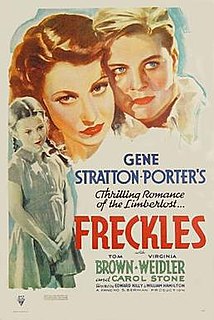
Freckles is a 1935 American drama film directed by Edward Killy and William Hamilton from a screenplay written by Dorothy Yost, adapted by Mary Mayes from Gene Stratton-Porter's 1904 novel of the same name. Two earlier adaptations of Stratton-Porter's novel had been produced, the first by Paramount in 1917, and the second in 1928 by FBO, both were also titled Freckles. This 1935 version was released by RKO Radio Pictures on October 4, and stars Tom Brown, Virginia Weidler, and Carol Stone.

The Farmer in the Dell is a 1936 American comedy film directed by Ben Holmes from a screenplay by Sam Mintz and John Grey, adapted from Phil Stong's 1935 novel, which was similarly titled, Farmer in the Dell. The film was premiered by RKO Radio Pictures in New York City on March 6, 1936, and released widely later that month on March 27. It stars Fred Stone, Jean Parker, and Esther Dale.
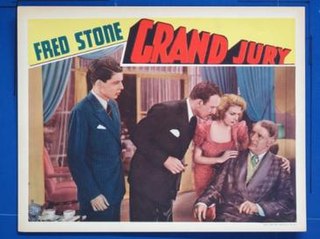
Grand Jury is a 1936 American crime drama film directed by Albert S. Rogell using a script by Joseph A. Fields and Philip G. Epstein, based on a story by James Edward Grant and Thomas Lennon. Produced and distributed by RKO Radio Pictures, it premiered in New York City on July 31, 1936, and was released nationwide the following week on August 7. The film stars Fred Stone, Louise Latimer and Owen Davis, Jr.

Don't Turn 'Em Loose is a 1936 American crime drama film directed by Ben Stoloff and produced by RKO Radio Pictures, who released the film on September 18, 1936. Written by Harry Segall and Ferdinand Reyher, the production’s screenplay is at least partially based on "Homecoming" by Thomas Walsh, a short story published in Collier's magazine in March 1936. The film costars Lewis Stone, James Gleason, Bruce Cabot, Louise Latimer and Betty Grable.
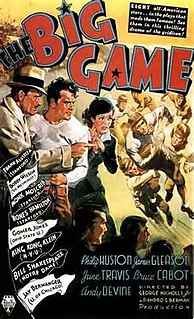
The Big Game is a 1936 American sports drama film directed by George Nicholls, Jr. and produced by RKO Radio Pictures, which released the film on October 9, 1936. The screenplay was written by Irwin Shaw, adapted from the 1936 novel of the same name by Francis Wallace. The film stars Philip Huston, James Gleason, June Travis, Bruce Cabot and Andy Devine. Huston (1908-1980) was a respected New York stage actor, who also had prominent roles in a number of motion pictures and, later, acted in television productions, as well.

Criminal Lawyer is a 1937 American drama film directed by Christy Cabanne from a screenplay by G. V. Atwater and Thomas Lennon, based on a story by Louis Stevens. The film stars Lee Tracy, Margot Grahame and Eduardo Ciannelli. RKO produced the film and premiered it on January 26, 1937 in New York City, with a national release a few days later on January 29. It was the second time Stevens' story had been used for a film, the first being 1932's State's Attorney, starring John Barrymore and Helen Twelvetrees, directed by George Archainbaud, and also produced and released by RKO.
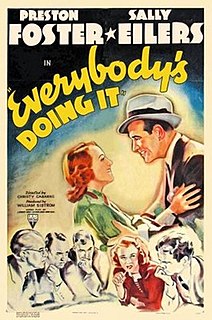
Everybody's Doing It is a 1938 American comedy film directed by Christy Cabanne using a screenplay by J. Robert Bren, Edmund Joseph, and Harry Segall, based on George Beck's story. RKO produced and distributed the film, releasing it on January 14, 1938. The movie stars Preston Foster and Sally Eilers.
Double Danger is a 1938 American crime drama directed by Lew Landers, using a screenplay by Arthur T. Horman and J. Robert Bren based on Horman's story. The film stars Preston Foster and Whitney Bourne, with supporting roles by Donald Meek and Samuel S. Hinds. Produced by RKO Radio Pictures, it was released on January 28, 1938.

China Passage is a 1937 American mystery film directed by Edward Killy from a screenplay by Edmund L. Hartmann and J. Robert Bren, based on a story by Taylor Caven. RKO Radio Pictures produced the film, which stars Constance Worth, Vinton Haworth, Leslie Fenton and Gordon Jones. Haworth was injured in an automobile accident in January 1937, delaying the film's released until March 12, 1937.

Danger Patrol is a 1937 American drama film directed by Lew Landers from a screenplay by Sy Bartlett based on a story by Helen Vreeland and Hilda Vincent. Produced and distributed by RKO Radio Pictures, it was released on December 3, 1937 and stars Sally Eilers, John Beal, and Harry Carey.
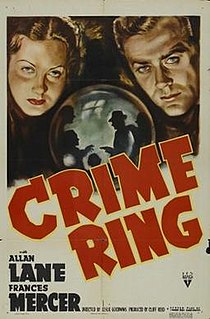
Crime Ring is a 1938 American crime drama film directed by Leslie Goodwins from a screenplay by J. Robert Bren and Gladys Atwater, based on a story by Reginald Taviner. The film stars Allan Lane and Frances Mercer, and was produced and distributed by RKO Radio Pictures, released on July 8, 1938.
Arthur T. Horman was an American screenwriter whose career spanned from the 1930s to the end of the 1950s. During that time he wrote the stories or screenplays for over 60 films, as well as writing several pieces for television during the 1950s.
Lee Marcus, also known as Lee S. Marcus, was an American film producer of the 1930s and 1940s. During his fifteen-year career he produced over 85 films, most of them between 1934 and 1941 while he was at RKO Studios. Prior to his production career, Marcus worked for FBO and then RKO as a sales executive, reaching the level of vice president in both organizations. At RKO, he was head of production of the studio's b-films during the late 1930s and the beginning of the 1940s. He was also responsible for producing what many consider to be the first film noir, 1940's Stranger on the Third Floor.
















